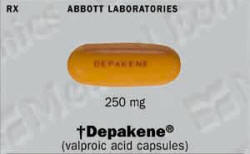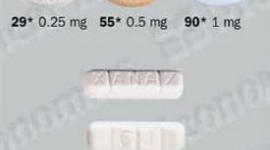Depakene (Valproic Acid) Patient Information
Find out why Depakene is prescribed, side effects of Depakene, Depakene warnings, effects of Depakene during pregnancy, more - in plain English.
Generic name: Valproic acid
Brand name: Depakene
Pronounced: DEP-uh-keen
Depakene (valproic acid) Full Prescription Information
Why is Depakene prescribed?
Depakene, an epilepsy medicine, is used to treat certain types of seizures and convulsions. It may be prescribed alone or with other anticonvulsant medications.
Most important fact about Depakene
Depakene can cause serious, even fatal, liver damage, especially during the first 6 months of treatment. Children under 2 years of age are the most vulnerable, especially if they are also taking other anticonvulsant medicines and have certain other disorders such as mental retardation. The risk of liver damage decreases with age; but you should always be alert for the following symptoms: loss of seizure control, weakness, dizziness, drowsiness, a general feeling of ill health, facial swelling, loss of appetite, vomiting, and yellowing of the skin and eyes. If you suspect a liver problem, call your doctor immediately.
Note too that Depakene has been known to cause rare cases of life-threatening damage to the pancreas. This problem can develop at any time, even after years of treatment. Call your doctor immediately if any of the following warning signs appear: abdominal pain, loss of appetite, nausea, and vomiting.
How should you take Depakene?
If Depakene irritates your digestive system, take it with food. To avoid irritating your mouth and throat, swallow Depakene capsules whole; do not chew them.
--If you miss a dose...
If you take 1 dose a day, take the dose you missed as soon as you remember. If you do not remember until the next day, skip the dose you missed and go back to your regular schedule.
If you take more than 1 dose a day and you remember the missed dose within 6 hours of the scheduled time, take it immediately. Take the rest of the doses for that day at equally spaced intervals. Never take 2 doses at once.
--Storage instructions...
Store at room temperature.
What side effects may occur using Depakene?
Side effects are more likely if you are taking more than one epilepsy medication, and when you are taking higher doses of Depakene. Indigestion, nausea, and vomiting are the most common side effects when you first start taking this drug.
If any side effects develop or change in intensity, inform your doctor as soon as possible. Only your doctor can determine if it is safe for you to continue taking Depakene.
-
More common side effects of Depakene may include: Abdominal cramps, amnesia, breathing difficulty, depression, diarrhea, dimmed or blurred vision, drowsiness, hair loss, indigestion, infection, involuntary eye movements, loss or increase in appetite, nausea, nervousness, ringing in the ears, sleeplessness, swelling of the arms and legs due to fluid retention, throat inflammation, tremors, vomiting
-
Less common or rare side effects may include: Abnormal dreams, abnormal gait, abnormal taste, aggression, anemia, anxiety, back pain, belching, bleeding, blood disorders, bone pain, breast enlargement, breast milk not associated with pregnancy or nursing, bruising, changes in behavior, chest pain, coma, confusion, constipation, cough, deafness, difficulty in speaking, dizziness, double vision, dry skin, dulled senses, ear pain and inflammation, emotional upset, excessive urination (mainly children), feeling of unwellness, fever, gas, growth failure in children, hallucinations, headache, high blood pressure, involuntary jerking, irregular heartbeat, irregular menstrual periods, itching, joint pain, lack of coordination, leg cramps, liver disease, loss of bladder control, loss of coordination, menstrual abnormalities, muscle pain, muscle weakness, nosebleed, overactivity, personality disorder, pneumonia, prickling or tingling sensation, rash, rickets (mainly children), sedation, sensitivity to light, sinus inflammation, skin eruptions or peeling, spots before the eyes, swollen glands, twitching, urinary tract infection, vaginal infection, vertigo, vomiting blood, weakness, weight loss or gain
Why should Depakene not be prescribed?
You should not take this drug if you have liver disease or your liver is not functioning properly, or if you have had an allergic reaction to it.
Special warnings about Depakene
Remember that liver failure is possible when taking Depakene (see "Most important fact about this drug"). Your doctor should test your liver function at regular intervals.
Also keep in mind the threat of damage to the pancreas (see "Most important fact about this drug"). This problem can develop rapidly, so contact your doctor immediately if you experience any symptoms.
In people with a rare set of genetic abnormalities called urea cycle disorders, Depakote may adversely effect the brain. Signs of a developing problem include lack of energy, repeated attacks of vomiting, and mental changes. If you suspect a problem, see your doctor immediately. Depakote may have to be discontinued.
Depakene has also been known to cause a very rare but potentially fatal skin condition. Contact your doctor if you notice any changes in your skin.
Some side effects are more likely if you have manic episodes or suffer from migraines. Your doctor will monitor your care closely if you have one of these conditions.
Because of the potential for side effects involving blood disorders, your doctor will probably test your blood before prescribing Depakene and at regular intervals while you are taking it. Bruising, hemorrhaging, or clotting disorders usually mean the dosage should be reduced or the drug should be stopped altogether.
Depakene may cause drowsiness, especially in older adults. You should not drive a car, operate heavy machinery, or engage in hazardous activity until you know how you react to the drug.
Do not abruptly stop taking this medicine without first consulting your doctor. A gradual reduction in dosage is usually required to prevent major seizures.
This drug can also increase the effect of painkillers and anesthetics. Before any surgery or dental procedure, make sure the doctor knows you are taking Depakene.
Possible food and drug interactions when taking Depakene
If Depakene is taken with certain other drugs, the effects of either could be increased, decreased, or altered. It is especially important to check with your doctor before combining Depakene with the following:
Amitriptyline (Elavil)
Aspirin
Barbiturates such as phenobarbital and Seconal
Blood-thinning drugs such as Coumadin and Dicumarol
Carbamazepine (Tegretol)
Clonazepam (Klonopin)
Diazepam (Valium)
Ethosuximide
Felbamate (Felbatol)
Lamotrigine (Lamictal)
Nortriptyline (Pamelor)
Phenytoin (Dilantin)
Primidone (Mysoline)
Rifampin (Rifater)
Tolbutamide (Orinase)
Zidovudine (Retrovir)
Extreme drowsiness and other serious effects may occur if Depakene is taken with alcohol or other central nervous system depressants such as Halcion, Restoril, or Xanax.
Special information if you are pregnant or breastfeeding
Depakene taken during pregnancy may harm the baby. The drug is not recommended for pregnant women unless the benefits of therapy clearly outweigh the risks. In fact, women in their childbearing years should take Depakene only if it has been shown to be essential in the control of seizures. Since Depakene appears in breast milk, nursing mothers should use it only with caution.
Recommended dosage for Depakene
ADULTS AND CHILDREN 10 OR OLDER
 The usual starting dose is 10 to 15 milligrams per 2.2 pounds of body weight per day. Your doctor may increase the dose at weekly intervals by 5 to 10 milligrams per 2.2 pounds per day until seizures are controlled or side effects become too severe. If stomach upset develops, the dose may be increased more slowly. The daily dose should not exceed 60 milligrams per 2.2 pounds per day.
The usual starting dose is 10 to 15 milligrams per 2.2 pounds of body weight per day. Your doctor may increase the dose at weekly intervals by 5 to 10 milligrams per 2.2 pounds per day until seizures are controlled or side effects become too severe. If stomach upset develops, the dose may be increased more slowly. The daily dose should not exceed 60 milligrams per 2.2 pounds per day.
OLDER ADULTS
Older adults generally are prescribed reduced starting doses, and receive dosage increases more gradually than younger people.
Overdosage of Depakene
Any medication taken in excess can have serious consequences. An overdose of Depakene can be fatal. If you suspect an overdose, seek medical help immediately.
- Symptoms of Depakene overdose may include: Coma, extreme drowsiness, heart problems
Depakene (valproic acid) Full Prescription Information
Detailed Info on Signs, Symptoms, Causes, Treatments of Bipolar Disorder
APA Reference
Staff, H.
(2009, January 4). Depakene (Valproic Acid) Patient Information, HealthyPlace. Retrieved
on 2026, March 1 from https://www.healthyplace.com/other-info/psychiatric-medications/depakene-valproic-acid-patient-information
